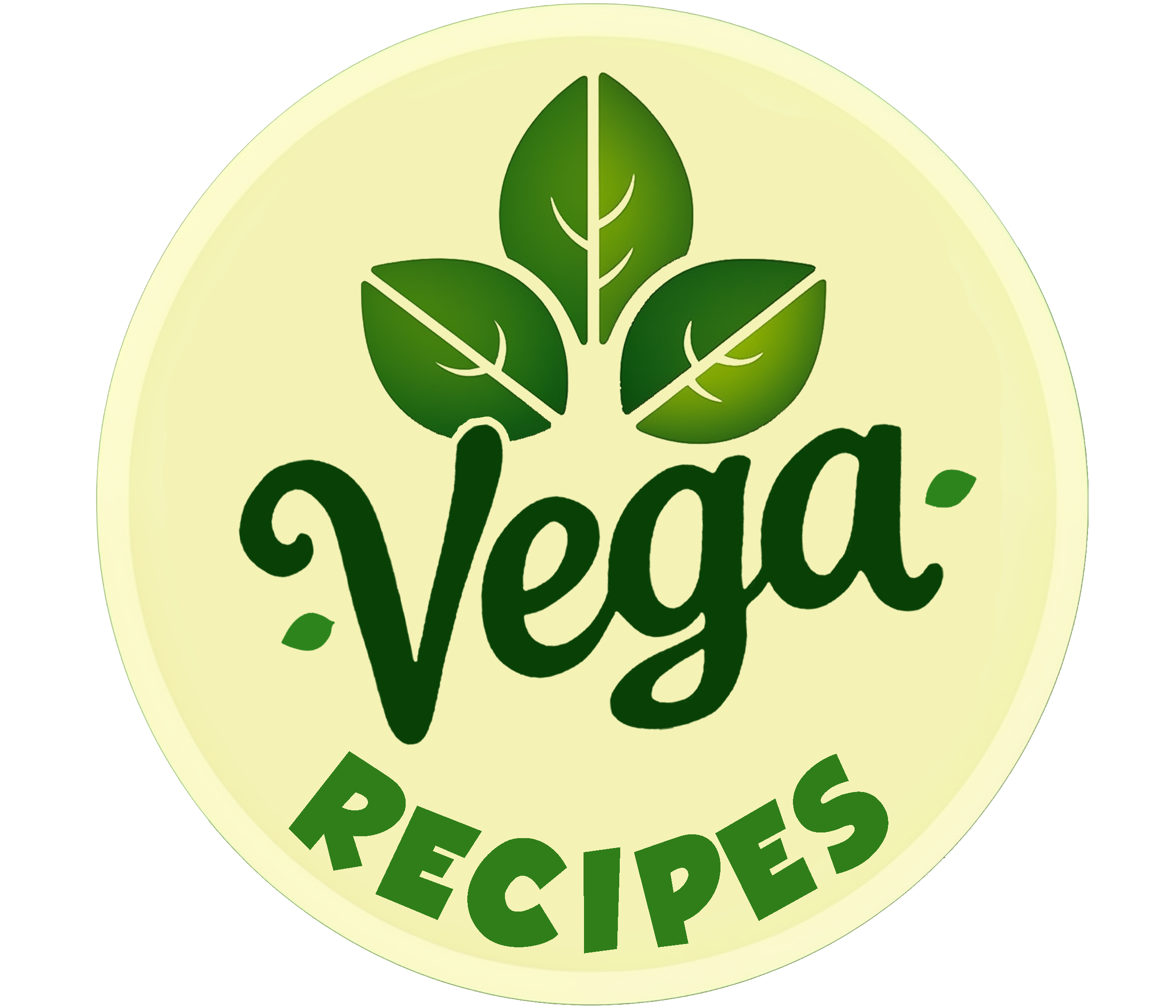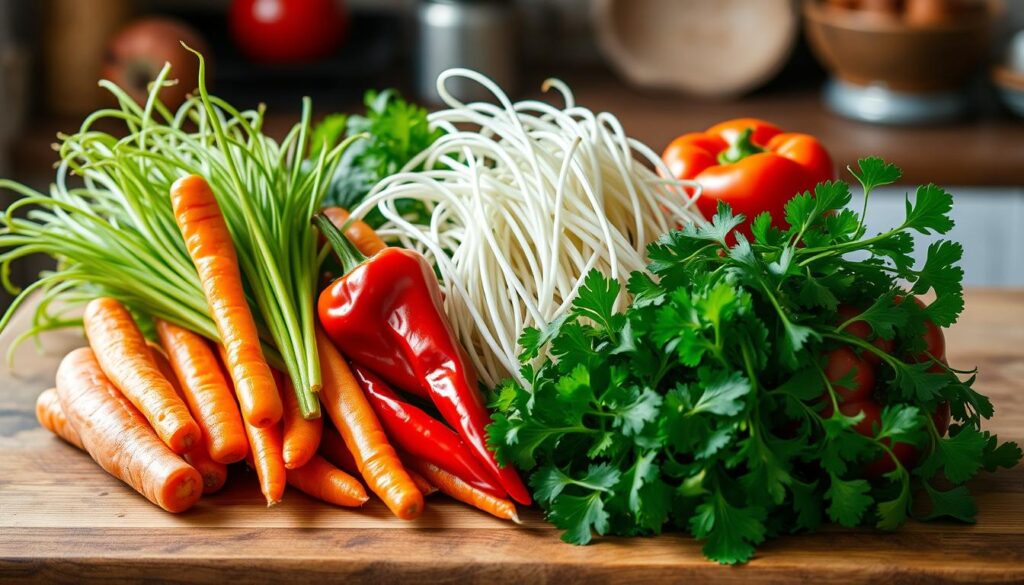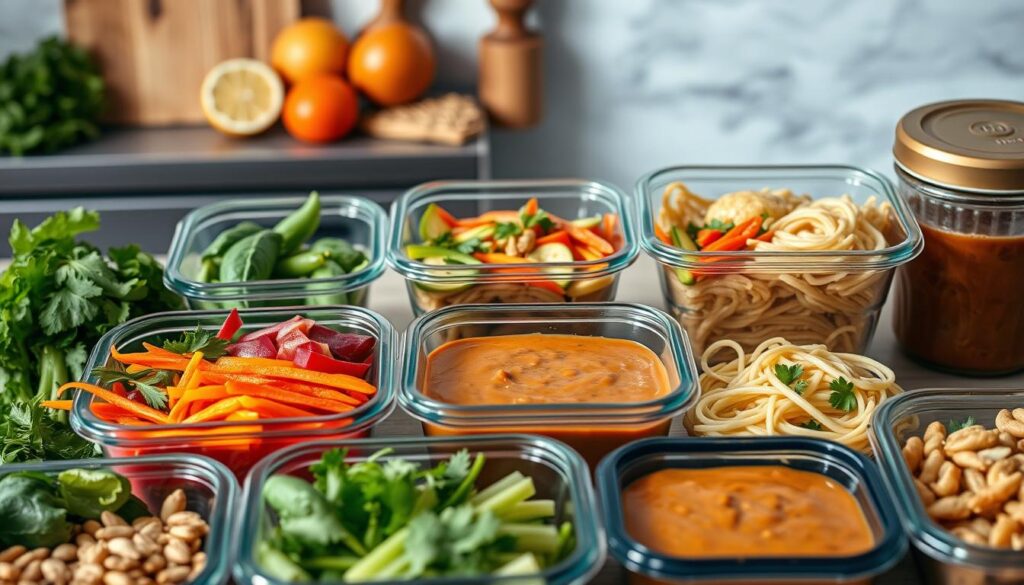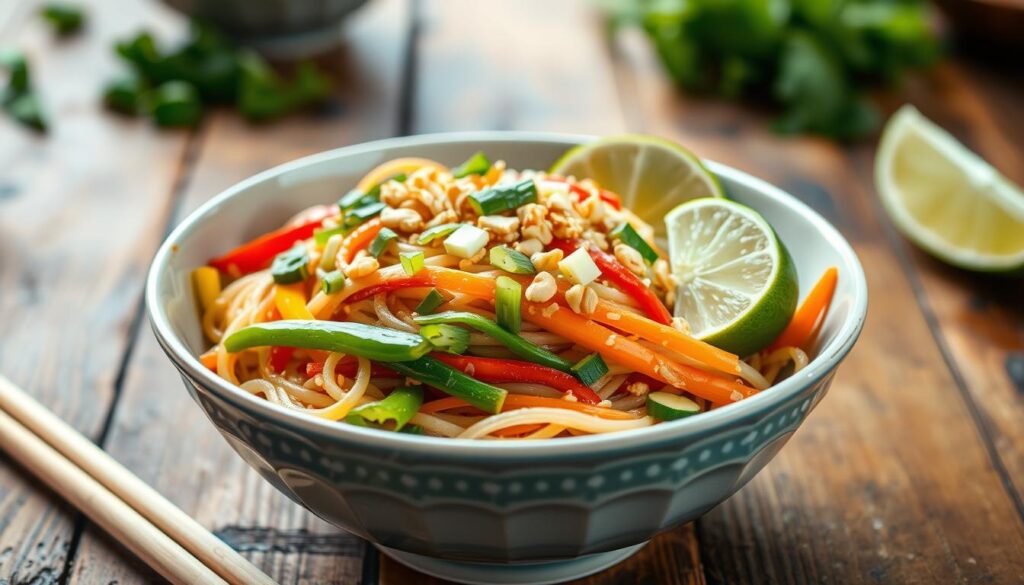Ever thought a vegan Pad Thai could really taste like the real Thai food? And be quick to make on a busy night?
I’m thrilled to share my simple vegan Pad Thai recipe. It uses fresh stuff like tofu, rice noodles, and a special sauce. You can make a tasty meal in just 30 minutes. This tofu Pad Thai is not only yummy but also good for you, proving vegan food can be flavorful.
With easy-to-find ingredients, I’ll show you how to make a real vegan Pad Thai. It will become a favorite in your kitchen.
Key Takeaways
- Preparation time is only 30 minutes.
- The recipe serves up to 4 portions, ideal for sharing.
- Essential ingredients include 14.5 ounces of tofu and 7 ounces of rice noodles.
- This dish can easily be customized with your favorite vegetables.
- Meal prep is simple, with leftovers lasting 3 to 4 days in the fridge.
Introduction to Vegan Pad Thai
Pad Thai is a classic Thai noodle dish loved for its vibrant flavors and satisfying texture. It combines sweet, salty, and tangy notes, making it a favorite worldwide. When I make my vegan pad thai, I use fresh ingredients to keep it authentic.
What is Pad Thai?
Pad Thai is a famous Thai street food. It’s made with flat rice noodles, veggies, and proteins. The sauce, with lime, tamarind, and soy sauce, is what makes it special. For my vegan version, I use tofu and vegan eggs, keeping it tasty and healthy.
The Benefits of a Vegan Version
Choosing vegan pad thai is good for your health and animal welfare. It’s packed with protein from tofu and vitamins from veggies. Quality ingredients make my vegan pad thai just as tasty as the real thing.
Key Ingredients for Vegan Pad Thai
Making vegan pad thai is all about using fresh, authentic ingredients. You’ll need a few key items to get that perfect flavor. Knowing what goes into your dish can really enhance your cooking.
Essential Ingredients for the Sauce
The sauce is the heart of pad thai. For amazing taste, use tamarind paste, soy sauce, and palm sugar. Tamarind adds a tangy depth, soy sauce brings saltiness and umami. Adding chili flakes lets you adjust the heat to your taste.
Getting the sauce right is key to a great meal.
Choosing the Right Rice Noodles
Choosing the right noodles is vital for vegan pad thai. I like dry rice noodles for stir-frying. About 4 ounces (112 grams) is enough for two servings.
Soaking them in warm water for 10 to 15 minutes makes them perfect. The right noodles make your dish truly authentic.
Fried Tofu: The Perfect Protein
Fried tofu is great for plant-based protein in vegan pad thai. Use firm or extra-firm tofu, cut into small cubes. Fry it until it’s golden and crispy.
This texture complements the other ingredients well. The crispy tofu soaks up the sauce’s flavors, making each bite rich. Add fresh veggies like shiitake mushrooms and bean sprouts for a nutritious meal.
How to Make Vegan Pad Thai
Making vegan pad thai is easy and quick, taking less than 30 minutes. It’s a simple recipe that shows how to make the sauce, cook the noodles, and stir-fry everything perfectly.
Preparing the Sauce Ingredients
Start by mixing the sauce ingredients for a balanced flavor. I mix ¼ cup of tamari (or soy sauce), 2 tablespoons of lime juice, 1½ teaspoons of chili garlic sauce, 2 tablespoons of maple syrup, and 1 tablespoon of rice vinegar in a bowl. This mix creates a vibrant taste that goes well with the other ingredients in my vegan pad thai.
Cooking the Rice Noodles
Then, cook the rice noodles. Boil a large pot of water and add 8 oz of medium rice noodles. Stir them gently to prevent sticking. Cooking takes about 5 minutes, keeping them firm. After cooking, I drain and rinse them under cold water to stop the cooking and set them aside.
Stir-Frying Your Pad Thai
The last step is to stir-fry everything together. In a skillet, I heat 1 tablespoon of sesame oil and cook the tofu cubes until golden, about 4 minutes. Then, I add fresh vegetables like spiralized zucchini, carrots, red bell pepper, and mushrooms, stir-frying until tender. I add the cooked noodles and sauce, making sure everything is coated. This creates a delicious plate of stir-fry noodles that captures the essence of pad thai.
Tips for a Perfect Pad Thai Recipe
Creating the perfect vegan pad thai requires a few key elements. Fresh vegetables and the right sauces are crucial. These tips help me make each bite full of flavor.
Using Fresh Vegetables
Fresh veggies make my vegan pad thai look great and taste better. Bell peppers, carrots, and scallions add color and nutrients. They also give a nice crunch, contrasting with the soft noodles.
Choosing seasonal produce lets me tailor my dish. It ensures I get the freshest flavors.
Choosing Between Fish Sauce and Vegan Alternatives
Switching to vegan alternatives for fish sauce is a game-changer. Soy sauce and vegan fish sauce bring that salty, umami taste to the dish. The right choice can make a big difference in flavor.
Vegan fish sauce captures the tangy essence of traditional recipes. This makes my vegan pad thai just as good as the classic version.
Serving Suggestions and Toppings
Enjoying vegan pad thai is more than just the main dish. Adding toppings and side dishes can really enhance the flavors and textures. Fresh lime wedges, crunchy peanuts, and vibrant mung bean sprouts are great choices. They add unique tastes and textures to each bite.
Ideal Toppings for Vegan Pad Thai
Adding mung bean sprouts to vegan pad thai adds crunch and nutrition. Squeezing fresh lime wedges over the dish brightens the flavors. Chopped peanuts provide a nice contrast to the soft noodles and veggies. Together, these toppings make every serving memorable.
Pairing with Other Dishes
I like to pair vegan pad thai with other dishes for a complete meal. A crisp cucumber salad adds coolness to the rich pad thai flavors. A colorful veggie stir fry boosts the vegetable content. Both options add variety and freshness to the meal.
Simplifying Your Vegan Pad Thai Preparation
As a busy person, I know how crucial it is to make meal prep easy. My vegan Pad Thai recipe is simple and quick. I prepare the sauce, noodles, and tofu ahead of time, making cooking fun and stress-free.
By focusing on these key parts, I can cook faster and still enjoy a tasty meal. Plus, storing leftovers in the fridge lets me enjoy this dish all week long.
Meal Prep: Making Ahead
Preparing the Pad Thai sauce ahead is a big help. I mix soy sauce, brown sugar, tamarind, and peanut butter for a tasty base. I keep it in an airtight container.
I also cook my rice noodles and tofu early. I cut the tofu into cubes and fry them until crispy. This way, I can quickly reheat and mix everything when I’m ready to eat.
Storing Leftovers Efficiently
Leftovers from my vegan Pad Thai are common. I store them in an airtight container in the fridge. They stay good for up to four days.
To reheat, I use a skillet over medium heat. This keeps the dish warm and flavorful. It’s like having a fresh meal every time.
Variations of Vegan Pad Thai
Exploring different versions of vegan pad thai can make it even more exciting. Adding extra firm tofu or tempeh boosts the protein. These ingredients also bring new flavors and textures to the dish.
Adding Extra Protein Options
For more protein, try adding 1 cup of extra firm tofu. It adds about 20 grams of protein. Tempeh, with its nutty taste, is another great choice. Together, they make your vegan pad thai more satisfying.
If tofu and tempeh aren’t your thing, edamame is a tasty alternative. It adds fresh green notes and extra texture.
Creating a Gluten-Free Version
Want a gluten-free version? Brown rice pad thai noodles are perfect. They keep the dish’s texture great and are safe for those with gluten issues. Use gluten-free soy sauce or tamari for flavor.
Remember, cooking time might be different than regular noodles. But the result is a hearty, gluten-free vegan pad thai that everyone can enjoy!
The Taste of Authentic Vegan Pad Thai
Exploring authentic vegan pad thai, I find a deep connection to its traditional roots. The thai taste comes from a mix of sweet, salty, and tangy flavors. I use tamarind and maple syrup to bring out the classic taste, making it vegan.
My version is inspired by the traditional pad thai of Thailand. I avoid Western-Thai fusion dishes that lack authenticity. Ingredients like Chinese chives, bean sprouts, and preserved radish add freshness and texture. Together, they create a vibrant and satisfying meal.
For a true culinary experience, my authentic vegan pad thai pays homage to its heritage. It invites everyone to enjoy a flavorful dish that respects its roots. This balanced dish is perfect for snacking, capturing the essence of pad thai in every bite.
Conclusion
Vegan Pad Thai is a standout in the vegan food world. It’s tasty and easy to make, perfect for those eating plant-based. This recipe uses rice noodles, bean sprouts, and bell peppers for a quick, nutritious meal.
This dish is full of flavor and supports a healthy lifestyle. It’s rich in fiber and protein from tofu. It’s a great choice for anyone looking to eat better.
This vegan recipe is very flexible, allowing you to add your own twist. Try adding crushed peanuts or a squeeze of lime for something new. With vegan food becoming more popular, this recipe is a great way to join the trend.
Making this dish brings authentic Asian flavors to your home. It also shows the growing interest in new food combinations. Eating vegan can lower cholesterol and improve heart health, making it a tasty and healthy choice.




